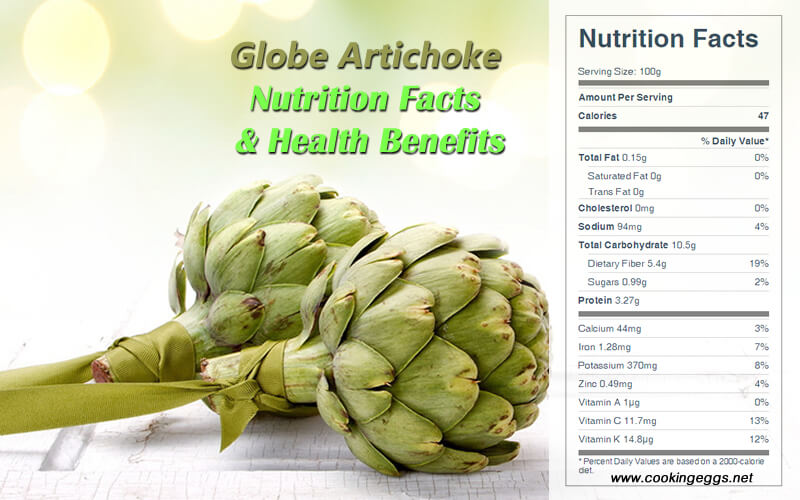Globe Artichoke Nutrition Facts & Health Benefits
Artichokes are a staple in the Mediterranean diet. There is probably no single food more emblematic of Mediterranean cuisine than the globe artichoke. Here are the nutritional benefits of artichokes.
Artichokes are a good source of the minerals magnesium, chromium, manganese, and potassium, as well as vitamins A and C, folic acid, niacin, riboflavin, thiamine, and biotin. They also provide dietary fiber.
Raw artichokes are 84.9% water, 11% carbohydrates, 3% protein, and small amounts of fat. The artichoke is a rich source of folate and is a moderate source of vitamin K, magnesium, sodium, and phosphorus.

Nutritional Composition of Artichoke
One medium boiled artichoke provides 150 calories, 33.5 g carbohydrate, 10.4 g protein, 0.5 g fat, 16.2 g dietary fiber, 531 IU vitamin A, 30 mg vitamin C, 3 mg niacin, 153 mcg folic acid, 1062 mg potassium, 285 mg sodium, 258 mg phosphorus, 135 mg calcium, 3.87 mg iron, 180 mg magnesium, and 1.47 mg zinc.
Raw Artichokes Nutrition Facts Label
Health Benefits of Artichokes
Artichokes are a staple in the Mediterranean diet. They are one of the oldest foods known to humans. Artichokes are considered a functional food because of their rich source of bioactive phenolic compounds and prebiotic fibers.
The main phenolic compounds in artichokes are caffeic acid derivatives, with chlorogenic acid being the most well-known of these derivatives, but the active compound that seems to be chiefly responsible is cynarine, which acts powerfully on the liver to promote the flow of bile and stimulate liver cell regeneration. Artichokes also contain fructans, such as inulin, making artichokes a superfood for anyone with liver or digestive problems.
Artichokes can lower cholesterol, protect liver cells, increase bile flow, and reduce damage. Historically, artichoke leaf extract has been used as a hepatoprotective measure—to protect the liver—due to the cynarin content. This bioactive compound was first identified in 1954 when it was isolated from artichoke leaf extract. A study of artichoke leaf extract found it significantly increases bile flow, which supports the liver’s ability to remove any harmful toxins.
The inulin in artichokes stimulates the growth of beneficial bacteria, and it does not lead to a rise in serum glucose or stimulate insulin secretion.
It also reduces LDL cholesterol: In a study of 143 adults with high cholesterol, taking artichoke leaf extract daily for 6 weeks resulted in a 22.9 percent decrease in LDL cholesterol.
Artichokes are high in fiber, providing a positive effect on the gut. The notable fiber found in artichokes is inulin (fructans). As a result, humans do not have the enzymes to digest inulin, and as a result, it serves as food for our gut microbiome. Inulin acts as a fertilizer for the microflora in the colon to increase the diversity of the gut.
In European folk medicine, it’s used to treat high blood pressure and ward off heart attacks; studies have shown that artichokes have a distinct cholesterol-lowering ability, as well as a marked diuretic effect.
All of these qualities make artichokes one of the great purifying and detoxifying plants, particularly useful for those with rheumatism, arthritis, or gout.
Artichokes also demonstrate antioxidant potential due to the flavonoid content (apigenin and luteolin). Luteolin is an antioxidant that may also be involved in healthy carbohydrate metabolism. Research has demonstrated this antioxidant activity through a reduction in oxidative stress on hepatocytes (liver cells).
The edible part of the artichoke is the flower bud. If it is allowed to bloom, the flower resembles a thistle, with a purple feathery top. Artichoke hearts are well worth the effort of nibbling away the leaves and peeling back the choke, for they are very rich in antioxidants. A cup of artichoke hearts has as high an Oxygen Radical Absorption Capacity (ORAC) rating as a cup of blackberries.
The total antioxidant capacity of artichoke flower heads is one of the highest reported for vegetables. The majority of the cynarine found in artichoke is located in the pulp of the leaves, though dried leaves and stems of artichoke also contain it. These healing powers are concentrated mainly in the leaves, and when you buy artichokes in a continental market, they are sold complete with stem and leaves for those who wish to avail themselves of this excellent natural medicine.